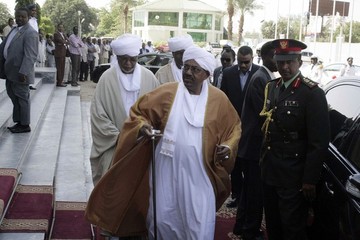Sudanese president defends media crackdown, pledges free & fair elections
October 28, 2013 (KHARTOUM) – Sudanese president Omer Hassan Al-Bashir announced today that 58 people will stand trial for their involvement in the protests which broke out in different parts of the country in late September over recent economic package adopted by the government and said that they will review “exceptional” measures taken against media outlets for their coverage of the demonstrations.

He went on to say that investigations into the protests unearthed evidence against 58 people, emphasising that law would be applied firmly against those who undermined security and vandalised properties.
Bashir also pledged that authorities would investigate the killings that occurred in the protests and nab perpetrators once identified. The Sudanese leader affirmed that his government is committed to paying out compensations to victims following the conclusion of the committees’ work which were set up to identify human and material losses.
He further pointed to those whom he described as “lying in wait” and said that they viewed the implementation of the economic package as a favourable opportunity to overthrow the regime, accusing them of standing behind the criminal groups which vandalized, destroyed, looted, and killed innocent citizens.
The violent clashes that erupted between demonstrators and security forces lead to about 70 deaths, according to official figures, although activists, rights groups and opposition parties put the death toll at more than 200.
Sudanese authorities said they arrested 700 in connection with the riots and denied using live ammunition against protesters. They accused outside elements of firing at the demonstrators, namely the rebel coalition known as the Sudan Revolutionary Front (SRF).
Bashir said that given the ordeal [the recent protests] subsided and life returned to normal, the government would now be open to reconsidering the exceptional measures applied against some individuals and media institutions that did not commit themselves to professionalism and objectivity rules.
Khartoum shut down the offices of the Dubai-based al-Arabiya and Sky News Arabia TV and intermittently suspended several dailies newspapers including pro-government ones such as al-Sudani, al-Meghar, al-Jareeda and al-Mash’had al-Aan.
The al-Intibaha newspaper owned by Bashir’s uncle was suspended indefinitely.
SUDAN ENGAGES WITH REBELS
Bashir renewed his call for the rebel groups in Darfur to sign the Doha Document for Peace in Darfur (DDPD) stressing the government’s readiness to pardon arms bearers and negotiate with them on arrangements for joining the peace process.
He also said that his government is keen on achieving peace in South Kordofan and Blue Nile states, calling upon rebels of the Sudan People’s Liberation Movement/North (SPLM-N) fighting there to resume negotiations in order to implement the remaining parts of the two areas protocols that were included in the 2005 Comprehensive Peace Agreement (CPA).
It was Bashir who swiftly scrapped a June 2011 framework agreement signed by his aide Nafie Ali Nafie with SPLM-N and has insisted that his government will deal militarily with the rebel movement.
But this year Sudanese officials announced a change in position and agreed to sit down with the SPLM-N but only on the basis of the protocols related to Blue Nile and South Kordofan in the CPA.
Last April, the first round of talks between the SPLM-N and the Sudanese government since 2011 resumed in the Ethiopian capital Addis Ababa under the auspices of the African Union (AU) but adjourned without success in achieving any breakthrough.
Last June, Bashir said that they will no longer negotiate with the rebels following their assault on towns in North and South Kordofan states.
The Sudanese president called upon political parties to participate in the upcoming elections, saying that it is the only means for change and reform, promising to conduct free and fair elections in 2015.
He did not directly address the recent split that emerged in his National Congress Party (NCP) but spoke of reform as being an integral part of the government’s philosophy.
This week, an NCP commission of inquiry established by Bashir recommended the dismissal of Bashir’s ex-adviser and former NCP majority leader in parliament Ghazi Salah al-Deen al-Attabani, along with two other members and suspending nine others for 12 months.
The punished members were among a larger group that included more than 30 NCP figures which signed on an open petition to president Bashir last month following the government’s decision to cut fuel subsidies which prompted a deadly wave of protests across the country.
The party’s leadership bureau chaired by Bashir endorsed the recommendations and referred it to the NCP Shura (consultative) Council to review and make a binding decision.
Al-Attabani was not present at the parliamentary session nor the other two dismissed members.
Salah Gosh, ex-chief of intelligence and former adviser to Bashir, who is also an MP attended the session which is his first since being charged in connection with an alleged coup attempt last year.
He was later released after prosecutors decided not to press charges in what appeared to be a presidential directive.
(ST)
